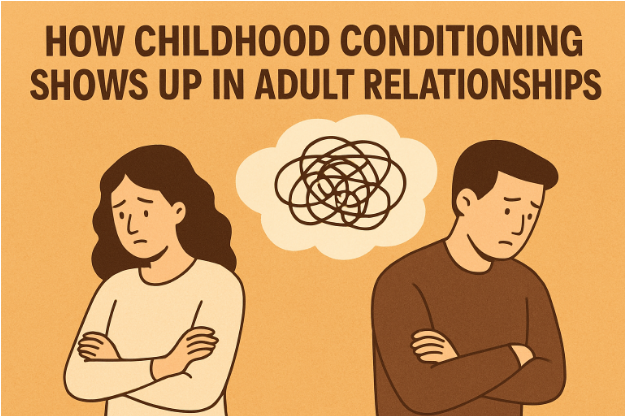








Most people think their relationship problems come from choosing the wrong partner or having bad luck. Therapists across the United States know the truth is usually deeper. Your relationship patterns often start long before your first relationship. They come from the emotional environment you grew up in.
Childhood conditioning is not about blaming your parents. It is about understanding the blueprint your mind and nervous system learned during your early years. You repeat what feels familiar, even if it is painful. This is why so many adults feel stuck in the same cycle: same arguments, same fears, same type of partner.
It is the emotional training you received without even noticing. Kids absorb everything. Tone. Behavior. Reactions. Attachment style. Conflict style. Emotional availability. Safety. All of these become your internal settings.
As adults, we don't act based on what we want. We act based on what feels safe. And "safe" is usually whatever matches your early experiences.
These patterns show up in almost every therapy session in the US, especially with people dealing with relationship stress, trust issues and emotional exhaustion.
If you grew up around criticism, you might feel drawn to partners who are hard to please. If you grew up around silence, you may choose partners who avoid emotions. It is not a conscious choice. Your body is repeating what it knows.
Insight: Familiar pain feels safer than unfamiliar peace.
If you had inconsistent love, you may crave connection but panic when someone gets too close. Or you cling too tightly because you are scared they will leave.
This is one of the most common attachment issues therapists see today.
If your feelings were dismissed as a child, you learned to hide them. As an adult, you may shut down during conflict, struggle to express needs or convince yourself everything is fine even when you are hurting.
If you grew up taking care of your parents' emotions, you might repeat this by choosing partners who need to be saved. You become the fixer. The stable one. The emotional support system. Meanwhile your own needs go ignored.
This pattern drains people fast.
If arguments in your home were explosive, unpredictable or traumatic, your adult brain sees conflict as danger. So you stay silent, agree to things you don't want or pretend nothing is wrong just to keep the peace.
You avoid the fire but end up burning yourself in the process.
If chaos, tension or unpredictable affection was normal, healthy relationships feel boring. You may feel chemistry only with partners who recreate emotional intensity.
Important: This is not love. It is a trauma bond disguised as attraction.
If you were teased, criticized or ignored, you may enter relationships already expecting to be left. You overthink, pull away first or read negativity even when it is not there.
Your body prepares for the pain before anything happens.
Your brain builds survival strategies early in life. Those strategies become automatic. So when you enter a relationship, you are not reacting with your adult self. You are reacting with the version of you that was shaped years ago.
Many US adults repeat these cycles because they were never taught emotional skills growing up. Families rarely talked about boundaries, communication, conflict, emotional safety or self worth. So you enter adulthood with the wrong tools and wonder why everything feels heavy.
Here is what actually helps. No unrealistic advice and no sugarcoating.
Stop blaming bad partners. Look at your habits.
Awareness is the start.
Ask yourself:
Most adults never ask these questions, but they change everything.
Healthy love often feels strange at first.
Lean into the discomfort. It means you are leaving your old emotional training behind.
You cannot build a healthy relationship if your nervous system is stuck in survival mode.
These help you respond instead of react.
Childhood patterns run deep and most people cannot see their own blind spots.
A therapist helps you trace the emotional root, understand your attachment style and practice healthier relationship tools.
Your relationship struggles are not random. They are not weakness. They are patterns built in childhood and repeated out of familiarity. When you understand the emotional blueprint you grew up with, you can finally rewrite it. You do not have to repeat the same cycles. You can build something healthier, more stable and more aligned with the adult you are becoming.
Remember: Change starts the moment you decide you will not let your childhood script decide the rest of your relationships.
Whether you're looking to strengthen an already healthy relationship or address specific challenges, couples therapy can provide valuable tools for growth and connection. Contact us to learn more about our couples counseling and relationship therapy services.
If this article resonated with you, share it with others who might benefit from these insights.